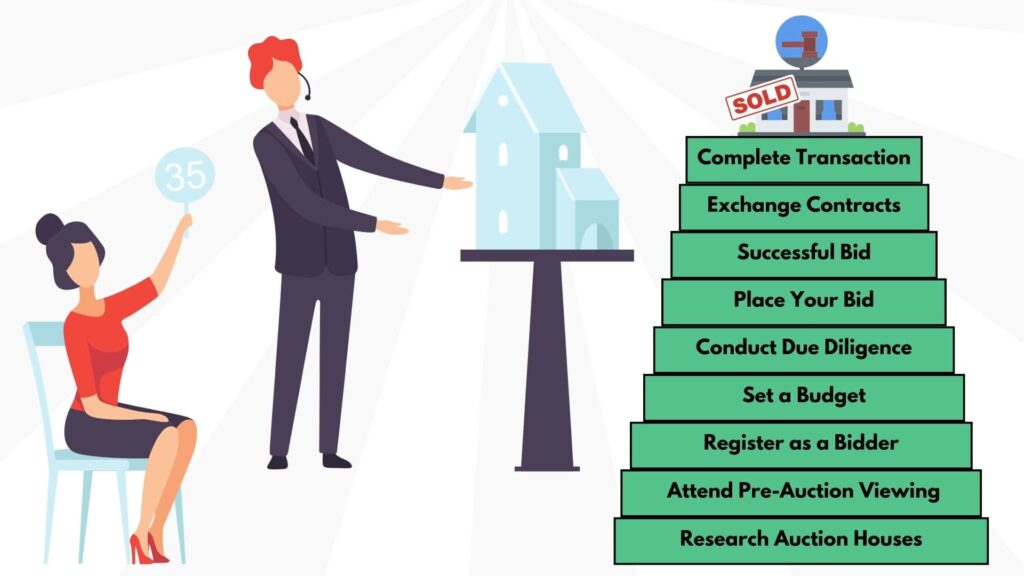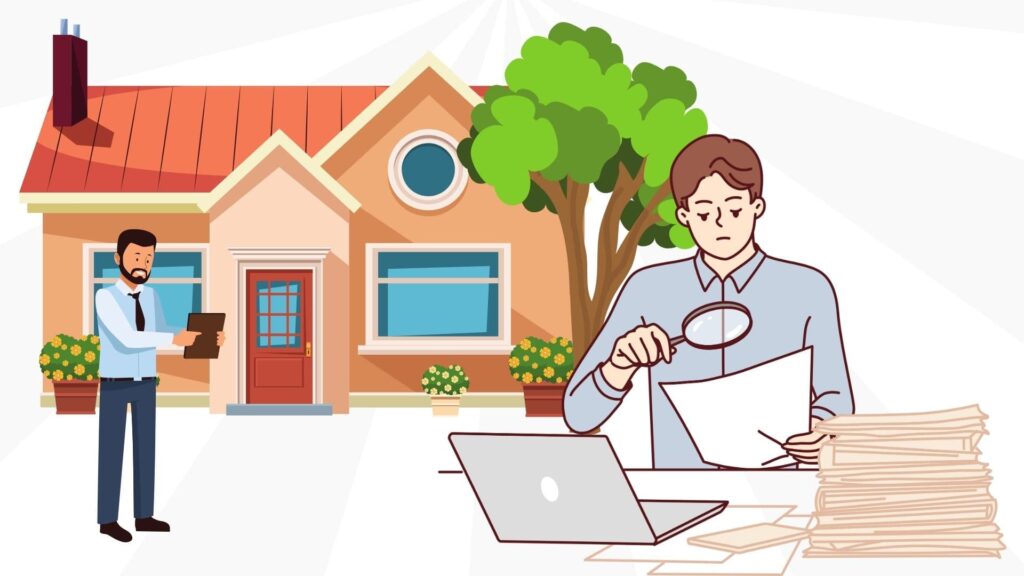
Sammie Ellard-King
I’m Sammie, a money expert and business owner passionate about helping you take control of your wallet. My mission with Up the Gains is to create a safe space to help improve your finances, cut your costs and make you feel good while doing it.
Buying an auction house can be an exciting and potentially profitable endeavour. It can also be scary as hell.
Whether you are looking to invest in real estate or find your dream home, purchasing a property through an auction can provide unique opportunities.
There are, however, plenty of things to consider and we’re going to unpack exactly how to buy an auction house.
I will guide you through the process of buying an auction house, from understanding the auction process to conducting due diligence and securing your purchase.
Key Takeaways:
Familiarise yourself with the auction process, from selecting reputable houses to the final transaction steps.
Prioritise thorough due diligence, covering legal packs, property surveys, and financial assessments.
Budget for all costs, including buyer’s premium, legal fees, and potential renovations, and secure financing ahead of the auction
Table of Contents
Understanding the Auction Process

Before diving into the specifics of buying an auction house, it’s crucial to have a solid grasp of how auctions work and the steps involved.
According to Home Selling Expert, 78% of mortgages actually make it to completion so make sure you’re not in the 22%!
Here’s a breakdown of the auction process:
1. Research Auction Houses: Start by identifying reputable auction houses that specialise in real estate. Look for firms that have a good track record and experience in the market.
2. Attend Pre-Auction Viewing: Most auction houses offer pre-auction viewings, allowing potential buyers to inspect the properties up for auction. Take advantage of this opportunity to thoroughly assess the properties and make note of any potential issues.
3. Register as a Bidder: To participate in an auction, you typically need to register as a bidder beforehand. This process may involve providing identification and proof of funds or mortgage pre-approval.
4. Set a Budget: Determine the maximum amount you are willing to spend on a property. It’s important to set a budget and stick to it to avoid overspending or getting caught up in the excitement of the auction.
5. Conduct Due Diligence: Before placing a bid, it’s crucial to conduct thorough due diligence on the property. This may include obtaining a legal pack, reviewing property surveys, and assessing any potential risks or liabilities.
6. Place Your Bid: When the auction begins, listen carefully to the auctioneer and follow their instructions. When you’re ready to place a bid, make sure your intentions are clear. Bidding can be fast-paced, so pay close attention to other bidders and be prepared to act quickly.

7. Successful Bid: If your bid is successful and meets the reserve price set by the seller, you will be the provisional winning bidder. However, keep in mind that the sale is still subject to contract and further negotiation.
8. Exchange Contracts: Once you have secured the property, you will need to sign the contract and pay a deposit, usually around 10% of the purchase price. This legally binds you to the purchase.
9. Complete the Transaction: The final step is completing the transaction, which involves paying the remaining purchase price within a specified timeframe, usually 28 days. Once the funds have been transferred, you will receive the keys to your new auction house.
Conducting Due Diligence
When buying an auction house, conducting thorough due diligence is essential to ensure you are making an informed decision.
The last thing I or you want is for you to lose out on the house or financially because you skipped this process. If anything this is the most important bit.
Here are some key areas to focus on during your due diligence process:
1. Legal Pack: Request a legal pack from the auctioneer, which typically includes important documents such as title deeds, searches, leases, and planning permissions. Review these documents carefully, or seek legal advice if needed, to understand any potential legal issues or restrictions.
2. Property Survey: Consider commissioning a property survey to assess the condition and potential risks associated with the house. A survey can help identify any structural defects or hidden problems that may impact your decision to purchase.
3. Financial Assessment: Assess your financial situation and determine your affordability. Evaluate how much you can realistically spend on the property, including additional costs such as renovation expenses, legal fees, and stamp duty.
4. Research Comparable Properties: Research the market value of similar properties in the area to ensure you are not overpaying. This can be done by looking at recent sales in the local property market or consulting with a real estate agent.
5. Visit the Property: Attend the pre-auction viewings to physically inspect the property. Look for signs of maintenance issues, structural integrity, and any major repairs or renovations that may be required.

6. Consult Professionals: Consider seeking advice from professionals such as solicitors, surveyors, or valuers to ensure you have a complete understanding of the property and any associated risks.
7. Check Legal Requirements: Research any local regulations, planning permissions, or building restrictions that may impact your plans for the property. Ensure you are fully aware of the legal requirements before proceeding with the purchase.
Associated Costs and Financing
When buying an auction house, it’s important to consider the associated costs and financing options.
Please don’t make the mistake of not understanding the ins and outs of the costs before going into the auction.
It’s vital that you have your financing in place before you get there so think about have a solid mortgage offer in place before you go.
We suggest looking at Boon Brokers who are a free online mortgage broker that don’t require any fees from you at all!
Boon Brokers are one of the UKs leading online mortgage brokers. They have a 5-star excellent Trustpilot rating with over 543 reviews.
- No mortgage fees
- Whole of market access
- Free online consultations
- Directly authorised by the FCA
- No in person meet ups
Here are some key expenses to keep in mind:
1. Buyer’s Premium: Auction houses often charge a buyer’s premium, which is an additional percentage added to the final purchase price. This fee covers the auctioneer’s commission and administrative costs, so make sure to factor it into your budget.
2. Legal Fees: You will need to hire a solicitor or conveyancer to handle the legal aspects of your purchase. Solicitors’ fees may vary, so it’s advisable to obtain multiple quotes and ensure you understand what services are included.
3. Survey Costs: If you choose to commission a property survey, be aware that additional fees will apply. Survey costs can vary depending on the size and complexity of the property, so obtain quotes from reputable surveyors.
4. Stamp Duty Land Tax (SDLT): In the UK, Stamp Duty Land Tax is payable on properties over a certain threshold. Make sure to calculate the SDLT based on the purchase price of the auction house and budget for this expense accordingly.
5. Renovation Costs: Factor in any potential renovation or refurbishment costs when budgeting for your purchase. Assess the condition of the property and seek professional advice to estimate the costs involved in making it habitable or improving its value.
6. Financing Options: Consider how you plan to finance your auction house purchase. If you require a mortgage, it’s important to obtain a mortgage agreement in principle before attending the auction. Alternatively, if you plan to use cash or alternative financing methods, ensure you have the funds readily available.
Boon Brokers are one of the UKs leading online mortgage brokers. They have a 5-star excellent Trustpilot rating with over 543 reviews.
- No mortgage fees
- Whole of market access
- Free online consultations
- Directly authorised by the FCA
- No in person meet ups
How can I increase my chances of buying an auction house?
To increase your chances of buying an auction house, follow these tips:
- Do thorough research on the property and market.
- Attend pre-auction viewings and inspect the property in person.
- Set a realistic budget and stick to it.
- Come prepared with a mortgage agreement in principle or proof of funds.
- Act quickly and confidently during the auction.
- Be mindful of other bidders and know when to stop bidding.
- Seek professional advice to guide you through the process.

How to find auction properties?
Dive into platforms like Zoopla, leveraging its advanced property search with ‘auction’ as your go-to keyword.
Spotted a tempting property? Don’t delay; get straight in touch with the estate agent or auction house featured in the listing.
They’ll not only offer the lowdown on the property but might also introduce you to other options on their roster. And remember, always check their credentials – a NAVA Propertymark affiliation is something to look out for.
What happens when I’ve won the auction?
Victory feels great, but it’s now go time!
Step one
Seal the deal with your deposit or reservation fee and then you can start the legal process.
If your purchase was via a modern auction, consider arranging a house survey. It’s not mandatory, but it can spotlight potential problems. Major issues? The modern auction method might offer an escape.
Step two
If you’re taking the mortgage route, have your lender assess the property’s value.
They’ll check the basics – think functional kitchen and bathroom – to determine if the price matches the property.
Step three
Shield your new asset. From the moment contracts are exchanged, you’re in charge.
Opt for building insurance pronto to safeguard against mishaps like fires or floods. And remember, insurance options abound – you’re not chained to your lender’s recommendation.
What happens if I pull out of the auction purchase?
Withdrawing from an auction purchase comes with financial consequences. The exact loss hinges on the auction type you’ve chosen. You also need to beware of substantial administrative charges too.
Often, discoveries about the property’s state or legal intricacies prompt buyers to retract their bid. They might uncover structural problems or legal notifications that derail their intentions.
Contemporary Auctions
If you retreat within the initial 28 days before sealing the deal with contracts and deposit, the 5% reservation charge vanishes.
Withdraw post-contract? Both your reservation charge and the 10% deposit evaporate.
However, if the seller opts out of a contemporary auction deal, your reservation charge and deposit return to you.
Traditional Auctions
Once the gavel drops in a traditional auction, it’s official; the contracts are swapped.
Legally, you’re now tied to the deal’s completion.
Deciding to retract means bidding goodbye to your 10% deposit, with possible extra admin charges looming.
Pros of buying a house at auction:
- Potential for snagging properties below market value.
- Quick transaction process, often wrapped up in 28 days.
- Transparent bidding, seeing the competition in real-time.
- Access to unique properties, including distressed assets.
- Chance to add value through renovations.
Cons of buying a house at auction:
- Limited scope for thorough due diligence
- Risk of hidden issues or unforeseen costs.
- Competitive bidding might inflate the price.
- Sold 'as-is', lacking seller warranties.
- Deposits can be non-refundable, risking monetary loss if the deal falters.
Boon Brokers are one of the UKs leading online mortgage brokers. They have a 5-star excellent Trustpilot rating with over 543 reviews.
- No mortgage fees
- Whole of market access
- Free online consultations
- Directly authorised by the FCA
- No in person meet ups
FAQs
What are the advantages of buying an auction house?
Buying an auction house offers several advantages, including:
– Potential for lower purchase prices compared to traditional sales.
– Opportunities to find unique or distressed properties.
– Transparent and competitive bidding process.
– Speedy transaction completion, typically within 28 days.
– Potential to add value through renovation or refurbishment.
What are the risks of buying an auction house?
While buying an auction house can be rewarding, it’s important to be aware of the potential risks involved, such as:
– Limited time for due diligence and inspections.
– Possibility of unexpected issues or hidden costs.
– Competition from other bidders, potentially driving up the price.
– Properties sold as-is, without any seller warranties or guarantees.
– Potential for non-refundable deposits and the risk of losing money if the purchase falls through.
Can I finance the purchase of an auction house with a mortgage?
Yes, it is possible to finance the purchase of an auction house with a mortgage.
However, it is essential to obtain a mortgage agreement in principle before the auction and ensure that you have the funds readily available to pay the deposit and complete the transaction within the required timeframe.
Can I buy an auction house as my first property?
Yes, buying an auction house as your first property is possible. However, it’s crucial to thoroughly research and understand the auction process, associated costs, and potential risks.
Seeking advice from professionals, such as solicitors or surveyors, can help ensure a smooth and successful purchase.
Are there any additional costs associated with buying an auction house?
In addition to the purchase price, there are several additional costs to consider when buying an auction house.
These may include buyer’s premiums, legal fees, survey costs, stamp duty land tax (SDLT), renovation expenses, and any financing costs or mortgage fees.
It’s important to budget for these expenses to avoid any surprises during the transaction.
Can I inspect the auction property before buying?
Yes, most auction houses allow potential buyers to inspect the properties before the auction.
It is highly recommended to attend the pre-auction viewings to assess the property’s condition, identify any potential issues, and determine if it meets your requirements.
Take the time to thoroughly inspect the property and ask any questions you may have to make an informed decision.
What happens if I'm the highest bidder at the auction?
If you are the highest bidder and your bid meets the reserve price set by the seller, you will become the provisional winning bidder. However, this does not guarantee the purchase.
The sale is still subject to contract and further negotiation. After the auction, you will need to exchange contracts and complete the transaction within the specified timeframe.
Can I back out of the purchase after winning the auction?
Backing out of the purchase after winning the auction is generally not advisable. When you win the auction and exchange contracts, you are legally bound to proceed with the purchase.
Failure to do so may result in financial penalties or legal consequences. It’s important to be certain about your decision before placing any bids and to conduct thorough due diligence beforehand.
Do I need a solicitor when buying an auction house?
Having a solicitor or conveyancer is highly recommended when buying an auction house.
They will handle the legal aspects of the purchase, review the legal pack, assist with contract preparation or amendments, and ensure that the transaction proceeds smoothly.
A solicitor can also provide guidance on your rights and obligations as a buyer, helping you navigate any legal complexities.
Can I buy an auction house remotely?
Yes, it is possible to buy an auction house remotely. Many auction houses offer online bidding platforms or accept phone or proxy bids.
However, it’s important to check the specific auction house’s policies and procedures regarding remote bidding.
Ensure you have a strong internet connection or alternative communication methods to participate effectively in the auction.
Conclusion
Buying an auction house can be a thrilling experience. By understanding the auction process, conducting due diligence, and carefully managing costs, you can navigate the purchase successfully.
Remember to approach each auction house with a clear plan, set a budget, and seek professional advice to ensure a smooth transaction.
With the right preparation and strategy, you can find your dream auction house and secure a valuable investment.
Share on social media
Disclaimer: Content on this page is for informational purposes and does not constitute financial advice. Always do your own research before making a financially related decision.



